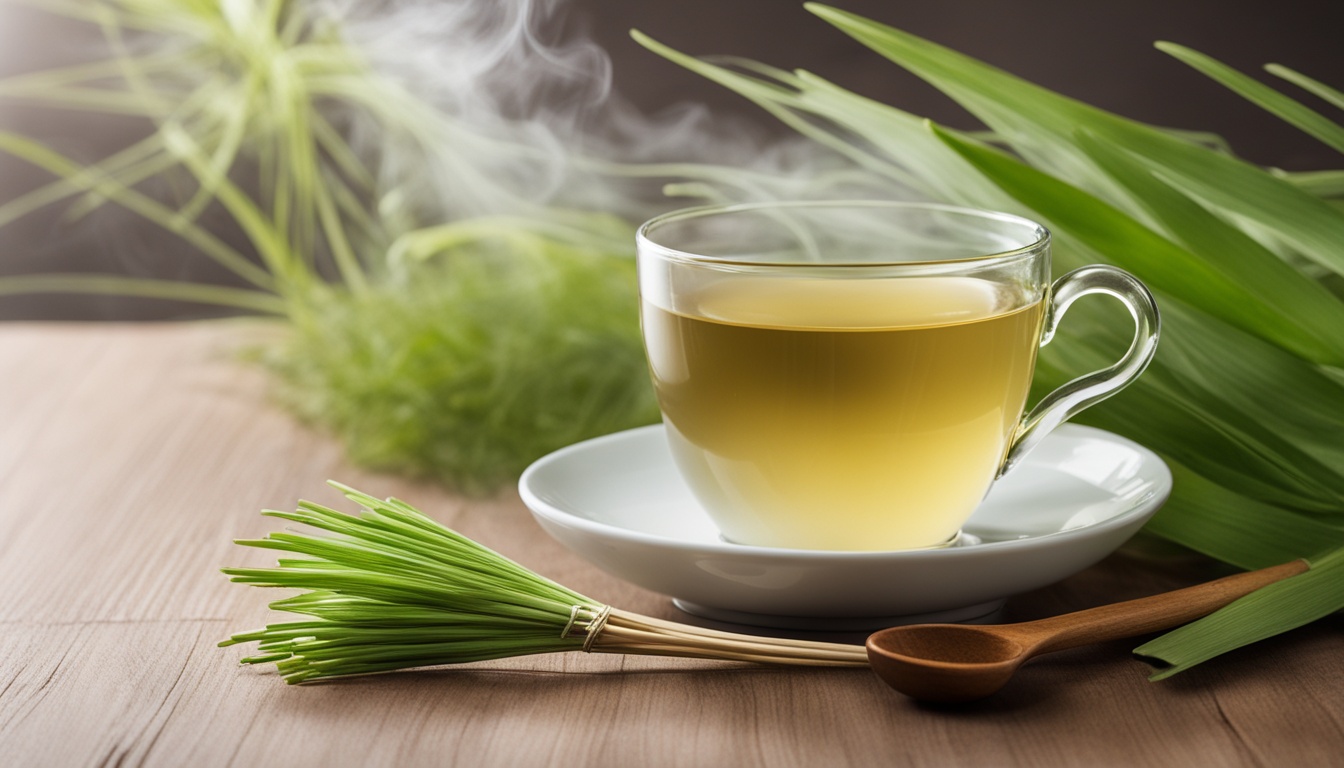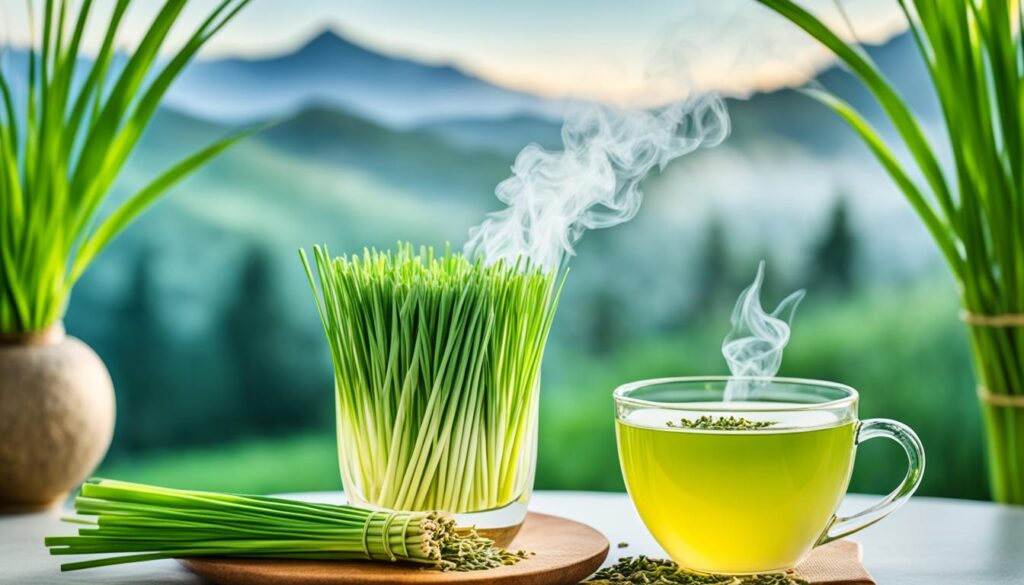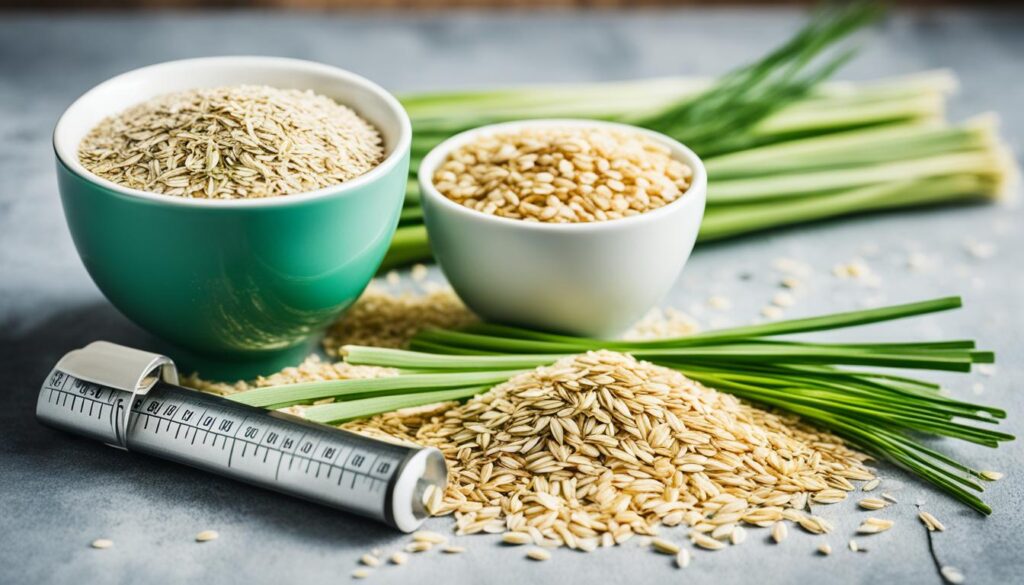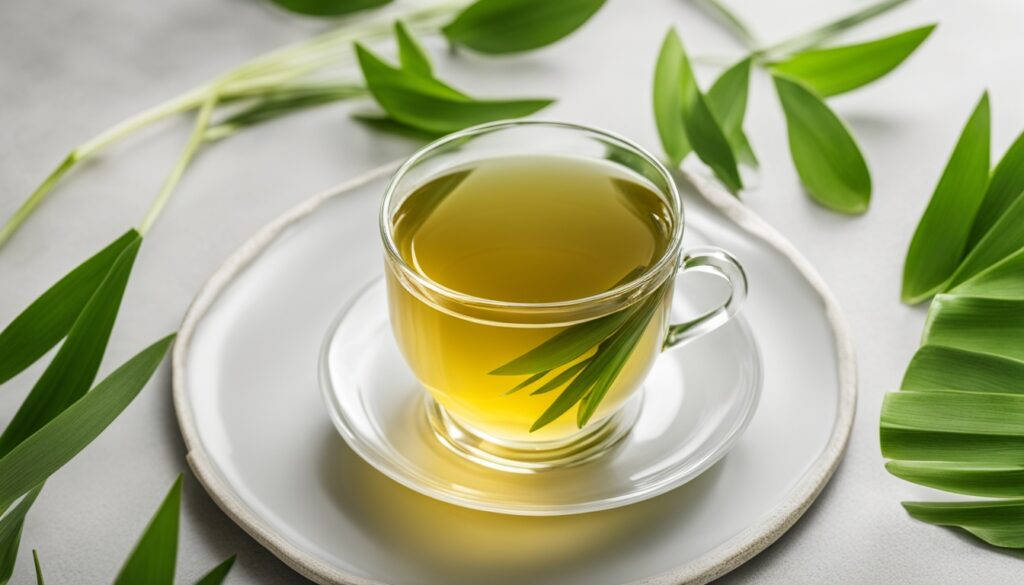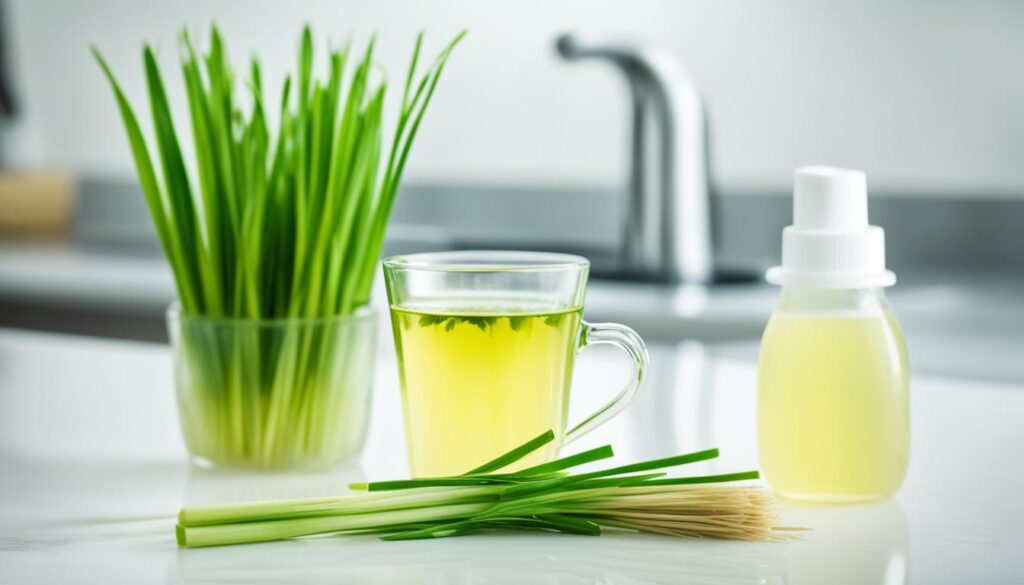Lemongrass tea is loved for its taste and calming scent. But, it brings more to the table than just that. It’s known to have several health benefits.
Research shows that lemongrass fights inflammation with compounds like chlorogenic acid. Other inflammation fighters in it are isoorientin and swertiajaponin. This makes it helpful for those with inflammatory issues.
Some studies also found that lemongrass might lower anxiety. So, it could be great for easing stress and helping people relax.
Besides, lemongrass extracts can reduce cholesterol. This might lower the chance of heart problems. It also fights off infections, which helps those with weak immune systems.
Chewing lemongrass stalks might make your mouth healthier. This is because it stops bacteria from growing. It might also lessen pain for those who need relief.
Key Takeaways:
- Lemongrass tea has compounds that fight inflammation in the body.
- It might help lessen anxiety.
- Lemongrass can lower your cholesterol.
- It fights off infections, reducing the risk of thrush in people with weak immune systems.
- Chewing lemongrass might make your mouth cleaner by stopping bacteria growth.
Lemongrass Tea and Inflammation
Lemongrass tea is both a tasty drink and might help fight body inflammation. It has special compounds like chlorogenic acid that fight inflammation. This can help with certain health problems.
Inflammation is the body’s natural way to fight off harm or sickness. But, too much of it can lead to health issues. These can include pain, heart problems, and diseases that affect the immune system.
Drinking lemongrass tea daily might lower inflammation and its effects on the body. It contains substances that may adjust how our body reacts to inflammation. This could improve your health overall.
Research shows that lemongrass tea can be really good for you. It has antioxidants that could keep heart cells healthy. This could help prevent heart-related issues.
“Lemongrass herbal extracts are potent inhibitors of bacterial growth, particularly effective against bacteria that cause cavities in the mouth, such as Streptococcus sanguinis.”
Lemongrass also fights off germs, lowering the chance of getting sick. An article in the Food Chemistry journal showed its strong effect against mouth bacteria. This includes bacteria that cause cavities.
There’s more to learn about how lemongrass tea fights inflammation. Still, it might be a good addition to your diet. It could help with inflammation and keep you healthier.
Lemongrass Tea and Anxiety Relief
Many people around the world deal with anxiety. Luckily, there are ways to handle it. Natural remedies like lemongrass tea can be a big help. This herbal tea is not only tasty but also might have healthy effects.
The Memorial Sloan Kettering Cancer Center notes lemongrass’s scent could lower anxiety. More studies are needed to be sure of its anxiety-reducing benefits. However, many find lemongrass essential oil calming due to its aromatic compounds.
Drinking lemongrass tea daily may calm your nerves. It offers a peaceful moment and a break from stressors. This can be especially helpful during busy days.
Memorial Sloan Kettering Cancer Center on Lemongrass and Anxiety:
The Memorial Sloan Kettering Cancer Center suggests that the scent of lemongrass may help reduce anxiety.
Even though lemongrass tea might ease anxiety for some, results can vary. If anxiety is severe or if you worry about your mental health, talk to a doctor. They can give you advice tailored to your needs.
Lemongrass tea is more than calming; it’s a tasty drink suitable for any time of the day. Why not add it to your routine? Taking small moments to relax is key for your well-being.
Lemongrass Tea and Cholesterol Lowering
Research shows lemongrass tea might help lower cholesterol. A study in the Journal of Advanced Pharmaceutical Technology & Research found lemongrass extracts reduced cholesterol in animals. More studies are needed for humans, but these early results are promising.
Lemongrass extract’s effect on lowering cholesterol seems to increase with the amount used. This means using more lemongrass might lower cholesterol more. It’s good news for those wanting natural ways to help manage their cholesterol.
Cholesterol is important for the body, but high levels can lead to heart disease. Adding lemongrass tea to a healthy routine can be part of keeping cholesterol in check.
Even though animal studies show lemongrass tea might lower cholesterol, human studies are lacking. Before using lemongrass for cholesterol, it’s important to talk to a doctor or a healthcare expert.
Lemongrass Tea and Infection Prevention
The Memorial Sloan Kettering Cancer Center shows that lemongrass tea might stop infections. It could lower how many people get thrush, a fungal infection. This is especially true for people with weak immune systems, such as those with HIV.
A study in the Food Chemistry journal also found lemongrass extract can stop bacteria. It’s especially good at fighting the kind of bacteria that cause cavities, like Streptococcus sanguinis.
These results suggest that drinking lemongrass tea could be a natural way to help prevent infections. It fights off harmful bacteria and fungi. This helps keep our body’s good and bad microbes in balance, which is key for staying healthy.
However, know that we still need more research on lemongrass tea’s infection-fighting abilities. More studies are essential to fully understand how it works. We also need to learn the best amount and how often to drink it.
“Lemongrass tea may reduce thrush and block bacterial growth. This makes it a good drink for fighting off infections.”
Lemongrass Tea and Oral Health
Some cultures traditionally chew on lemongrass to keep their teeth healthy. Studies, like those in the Food Chemistry journal, show that lemongrass works well. It can stop bacteria, especially the kind that causes cavities, like Streptococcus sanguinis.
“Lemongrass extracts exhibit potent inhibitory effects on bacterial growth.”
Lemongrass tea can be good for your teeth. It can help keep your mouth clean and stop cavities. This is because it stops bacteria from growing in your mouth.
Lemongrass also fights free radicals with its antioxidants. Chlorogenic acid, isoorientin, and swertiajaponin are in lemongrass. They keep your mouth healthy by removing harmful free radicals.
Drinking lemongrass tea is an easy way to take care of your teeth. The National Institutes of Health say lemongrass oil fights bacteria. This includes the kind that leads to tooth decay.
More studies are needed to fully show how lemongrass tea helps your teeth. But, we know it has the potential to be a great natural way to take care of your mouth.
Key Points:
- Lemongrass tea has been traditionally used to improve dental health and maintain oral hygiene.
- Research in the Food Chemistry journal confirms the inhibitory effects of lemongrass extracts on bacterial growth, particularly those responsible for cavities.
- Lemongrass tea’s antibacterial and antioxidant properties contribute to promoting oral health.
- Lemongrass essential oil shows potential antimicrobial ability against bacteria that cause tooth decay.
Lemongrass Tea and Pain Relief
One study found that lemongrass might block pain. This could lower how much pain we feel. Lemongrass tea has chlorogenic acid, isoorientin, and swertiajaponin. These fight inflammation and might help with pain relief. Drinking lemongrass tea could make you feel less pain.
“Lemongrass tea contains compounds that can help fight inflammation, potentially reducing pain.”
Different people might feel different levels of pain relief from lemongrass tea. But it’s a good choice for anyone dealing with ongoing pain. It’s a comforting drink, whether you like it hot or cold. And it could offer more health perks than just easing pain.
Lemongrass Tea and Red Blood Cell Boosting
In 2015, a study looked at how lemongrass tea affects red blood cells. It found that drinking lemongrass tea for 30 days increased hemoglobin and red blood cell count. This hints that lemongrass tea might help our bodies make more red blood cells.
The reason for this is not completely clear. Yet, scientists believe that lemongrass’s antioxidants might be the key. Antioxidants protect cells from damage by harmful free radicals. This damage can cause many health issues.
Lemongrass tea is good for the heart because it raises red blood cell levels. These cells carry oxygen to our body’s organs. So, more red blood cells help make sure our body gets enough oxygen. This can improve our heart’s health.
Lemongrass tea is not just good for red blood cells. It’s also filled with antioxidants. Antioxidants fight free radicals, which are linked to cancer and aging. Drinking lemongrass tea can boost your immune system and keep you feeling well.
To get the perks of lemongrass tea, make it at home or buy it. Use fresh or dried lemongrass, steep it in hot water, then enjoy. You can also buy lemongrass tea bags at the store.
Lemongrass Tea and Bloating Relief
Looking for a natural way to ease bloating? Consider lemongrass tea. It works as a diuretic, helping your body release more urine. This is great for reducing bloating due to water retention, like in PMS or after eating certain foods.
A study in the Journal of Renal Nutrition showed lemongrass tea increased urine output a lot. This means it can really help reduce bloating. By making you pee more, it gets rid of extra fluid in your body.
Besides helping with bloating, lemongrass tea is good for you in other ways. It fights inflammation and aids with digestion. It has compounds that reduce swelling, making your digestive system healthier.
You can make lemongrass tea easily with these steps:
- Cut 1-2 lemongrass stalks into small pieces.
- Boil a cup of water.
- Pour the water over the lemongrass and let it steep for 5 minutes.
- Strain the tea and pour it into a cup.
- You can drink it hot or cold with ice.
If you have health issues or take medications, talk to your doctor before trying lemongrass tea. It’s usually safe, but it’s wise to get professional advice first.
Adding lemongrass tea to your day might lessen bloating and help your digestion. Take it after big meals or when you feel bloated. Drinking water and paying attention to your body can help you feel your best.
How to Prepare Lemongrass Tea
Love the fresh taste of lemongrass tea? You can make this healthy drink at home easily. Here’s a simple recipe for homemade lemongrass tea:
1. Start with 1-2 lemongrass stalks. Cut them into short pieces, around 1 to 2 inches long.
2. Boil a cup of water in a pot or kettle.
3. As the water boils, pour it over the lemongrass in a container. Let the mix sit for 5 minutes. This allows the water to soak up the lemongrass flavor.
4. Next, get rid of the lemongrass pieces by straining the tea into a cup.
5. Your lemongrass tea is ready to drink. You can have it hot. Or, for a cool drink, add ice.
Lemongrass tea gives you a boost without caffeine. It’s tasty and good for you. Plus, you can keep it in the fridge for a few days. Try making your own lemongrass tea today. Discover its great flavor and benefits!
